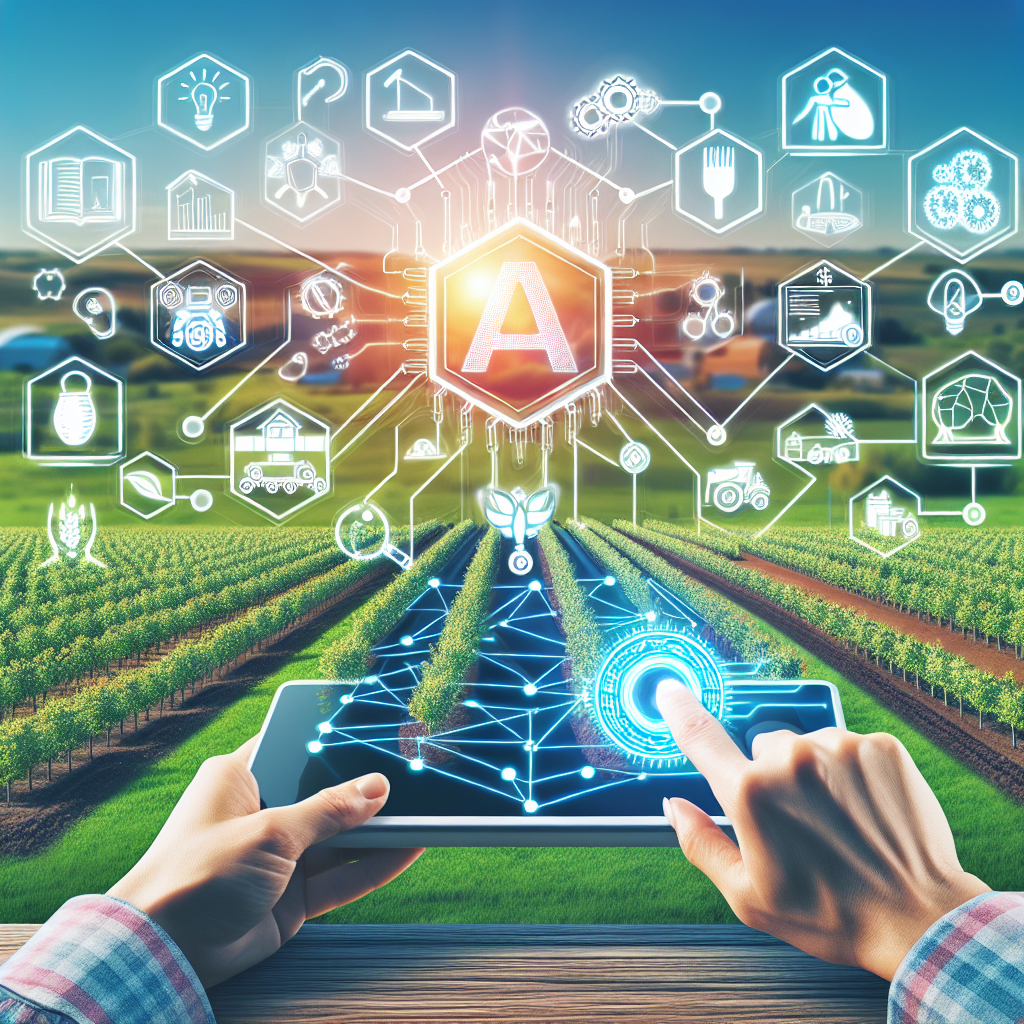Blockchain technology and artificial intelligence (AI) are two of the most groundbreaking technological advancements of the 21st century. When combined, they have the potential to revolutionize various industries, including agriculture. The use of AI applications in agri-blockchain has the ability to provide unprecedented levels of food traceability and transparency, leading to safer, more efficient, and sustainable food production systems.
In this article, we will explore the innovations and benefits of using AI applications in agri-blockchain, as well as address some frequently asked questions about this emerging technology.
What is Agri-Blockchain?
Agri-blockchain refers to the integration of blockchain technology in agriculture, specifically in the food supply chain. Blockchain is a decentralized, distributed ledger that records transactions in a secure and immutable manner. Each transaction is linked to the previous one, forming a chain of blocks that cannot be altered or tampered with.
In the context of agriculture, blockchain technology can be used to track the journey of food products from farm to table. By storing information such as the origin of the food, the farming practices used, the transportation and storage conditions, and the distribution channels on a blockchain, consumers can have full visibility into the entire supply chain.
What are AI Applications in Agri-Blockchain?
AI applications in agri-blockchain leverage the power of artificial intelligence to enhance the capabilities of blockchain technology in the agriculture sector. AI algorithms can process and analyze vast amounts of data generated throughout the food supply chain, providing valuable insights and enabling more informed decision-making.
Some of the key AI applications in agri-blockchain include:
1. Predictive Analytics: AI algorithms can analyze historical data to predict future trends and identify potential risks in the food supply chain. For example, predictive analytics can help farmers anticipate crop diseases, optimize harvest schedules, and improve yield forecasting.
2. Smart Contracts: Smart contracts are self-executing contracts with the terms of the agreement directly written into code. AI-powered smart contracts can automate transactions in the food supply chain, ensuring that all parties involved adhere to the agreed-upon terms and conditions.
3. Quality Control: AI algorithms can analyze data from sensors and IoT devices to monitor the quality and safety of food products in real-time. By detecting anomalies and deviations from the norm, AI can help prevent food contamination and spoilage.
4. Traceability: AI-powered traceability solutions can track the movement of food products throughout the supply chain, providing consumers with real-time information about the origin, production methods, and transportation of the food they consume.
5. Supply Chain Optimization: AI can optimize supply chain operations by identifying inefficiencies, reducing waste, and improving logistics and inventory management. By streamlining the flow of goods from farm to table, AI can help reduce costs and increase efficiency.
What are the Benefits of Using AI Applications in Agri-Blockchain?
The integration of AI applications in agri-blockchain offers a wide range of benefits for the agriculture industry, including:
1. Improved Traceability: By leveraging AI algorithms to track the journey of food products on a blockchain, consumers can have full visibility into the supply chain, enhancing trust and transparency.
2. Enhanced Food Safety: AI-powered quality control solutions can help prevent food contamination and spoilage by detecting anomalies and deviations in real-time, ensuring that only safe and high-quality products reach consumers.
3. Increased Efficiency: AI applications can optimize supply chain operations, reduce waste, and improve logistics and inventory management, leading to cost savings and increased efficiency.
4. Sustainable Agriculture: By providing farmers with valuable insights and predictive analytics, AI can help optimize crop production, reduce environmental impact, and promote sustainable farming practices.
5. Consumer Trust: AI-powered traceability solutions can help build consumer trust by providing real-time information about the origin, production methods, and transportation of food products, enabling consumers to make informed purchasing decisions.
FAQs about AI Applications in Agri-Blockchain
Q: How secure is blockchain technology in agriculture?
A: Blockchain technology is highly secure due to its decentralized and immutable nature. Each transaction is recorded in a block that is linked to the previous one, forming a chain that cannot be altered or tampered with. This makes blockchain an ideal solution for ensuring the security and integrity of data in the agriculture sector.
Q: How can AI improve food traceability in the agriculture industry?
A: AI can improve food traceability by analyzing vast amounts of data generated throughout the supply chain and providing real-time insights into the origin, production methods, and transportation of food products. By leveraging AI algorithms, farmers, retailers, and consumers can have full visibility into the journey of food products, enhancing trust and transparency.
Q: What are the challenges of implementing AI applications in agri-blockchain?
A: Some of the challenges of implementing AI applications in agri-blockchain include data privacy and security concerns, the need for interoperability between different systems and platforms, and the high costs associated with implementing AI technology. However, with proper planning and investment, these challenges can be overcome, leading to a more efficient and transparent food supply chain.
Q: How can consumers benefit from AI applications in agri-blockchain?
A: Consumers can benefit from AI applications in agri-blockchain by having access to real-time information about the origin, production methods, and transportation of food products. This can help consumers make more informed purchasing decisions, ensure the safety and quality of the food they consume, and promote sustainable farming practices.
In conclusion, AI applications in agri-blockchain have the potential to transform the agriculture industry by providing unprecedented levels of food traceability and transparency. By leveraging AI algorithms to analyze data generated throughout the supply chain and storing this information on a blockchain, farmers, retailers, and consumers can have full visibility into the journey of food products, leading to safer, more efficient, and sustainable food production systems. As this technology continues to evolve, it is important for stakeholders in the agriculture sector to embrace AI applications in agri-blockchain and unlock the full potential of this innovative technology.

